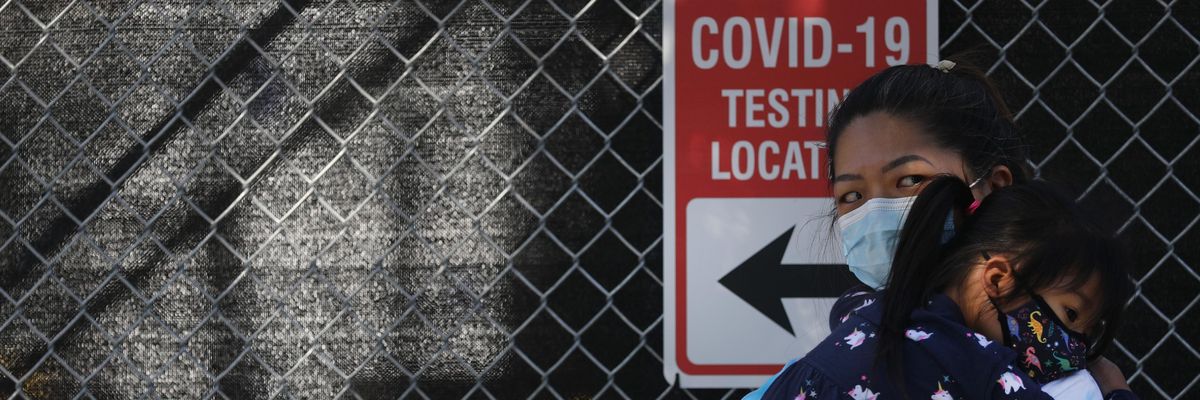A study by the National Institute of Health in the first 16 months of the coronavirus pandemic found that mothers in the U.S. were especially likely to report high levels of stress during the public health crisis if they experienced major disruptions to their daily lives at work, their children's schools, or in their interactions with their communities--as the majority of people surveyed said they did.
The NIH's Environmental Influences on Child Health Outcomes (ECHO) program surveyed more than 11,000 mothers between April 2020 and August 2021--the largest study to date regarding how mothers experienced the pandemic.
"It is critical to understand the associations between pandemic hardships and mental health of U.S. mothers."
More than 8,400 respondents reported that their lives had changed dramatically after the World Health Organization declared the worldwide coronavirus outbreak a pandemic in mid-March 2020 and schools and businesses across the U.S. and the planet were forced to close, furlough or lay off workers, and shift to remote-only models, along with other sweeping changes to daily life.
According to lead study author Theresa Bastain, associate professor of clinical population and public health sciences at the Keck School of Medicine of University of Southern California, researchers chose to examine the effects of the pandemic on the mental health of mothers because previous research has described how they took on much of the burden caused by pandemic-linked changes to the economy and education system.
Mothers "suffered a large share of the income and job losses and shouldered much of the responsibility of childcare and homeschooling children," the school said in a press release.
For example, Pew Research reported in October that for mothers whose youngest child was between the ages of five and 12, the average time they spent on secondary childcare--supervising children while doing other activities such as working--increased by about 2.5 hours between 2019 and 2020, going from 5.8 hours per day to 8.2 hours.
For fathers, this type of childcare increased by 1.2 hours between 2019 and 2020.
In September 2020, Pew also reported that mothers were more than three times as likely as fathers to have lost their jobs in the first months of the pandemic.
"Mothers may be particularly susceptible to psychological stress effects from the Covid-19 pandemic," reads the new study, which was published Friday in JAMA Network Open. "School closures impact working mothers, leading to loss of income and complimentary meals in school settings, unexpected childcare expenses, and gaps in adequate technology and quiet space for remote learning."
"It is critical to understand the associations between pandemic hardships and mental health of U.S. mothers," the study continues.
The researchers questioned mothers about how much their daily lives changed as a result of the pandemic, particularly about whether they began working remotely, became more isolated due to social distancing guidelines, had less access to healthcare, or got less physical exercise.
They also asked respondents if they had shown signs of acute stress disorder--defined as symptoms that arise after or during an event that threatens one's life or the life of a person's loved ones--including anxiety, negative moods, disassociation, avoidance, and sleeplessness.
Mothers who reported high levels of pandemic-related disruptions were more likely to report such symptoms, according to the study.
"It really came down to change and those mothers whose lives carried on much as they normally had, did not report as much stress," said Bastain. "It was the mothers who had big disruptions who reported the higher levels of stress."
Although low-income people and communities of color bore the brunt of the pandemic in numerous ways--with studies showing that Black Americans were more likely to be hospitalized for Covid-19 infections and that socioeconomic factors were linked to the increased odds that Black and Hispanic people test positive for the disease--the study published Friday showed that mothers with incomes that were higher than $30,000 were more likely to show signs of stress:
The high change cluster contained 8,412 mothers and was characterized by higher incomes, higher education, and higher cohabitation. The high change cluster was more likely to report financial concerns as a source of stress (3,008 participants [35.76%] vs. 925 participants [30.22%]) and had a higher proportion of White mothers (5,539 participants [65.85%] vs. 1,656 participants [54.10%]). Both clusters had similar distributions of Latina and Hispanic participants.
Lower-income people who were surveyed were more likely to have jobs in which they did not have the ability to work remotely, noted the researchers--putting them at greater risk for infection.
"However, along with the privilege of working remotely and being able to quarantine away from other household members, considerable disruption in day-to-day life was also experienced in the high change cluster including greater social isolation from family, friends, and colleagues, who are important sources of social support when confronted with a major traumatic life event," reads the study. "A surprising result was that mothers in the 'low change' cluster reported higher [post-traumatic stress] when they spent more time with family."
"Spending greater time with family might be stressful for mothers with lower socioeconomic advantage," the study continues, "especially if they reside in smaller homes where they may be unable to quarantine away from family members."
For mothers across socioeconomic and racial groups, said Bastain, the study "shows that we need to think about traumatic experiences like natural disasters, pandemics, or mass shootings more holistically."
"There is a wide range of hardships that people experience from these events that we need to understand," she added, "so that we can protect people from long-term effects."




